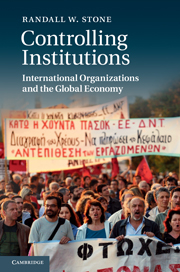Book contents
- Frontmatter
- Contents
- List of figures
- List of tables
- Preface
- List of abbreviations
- 1 Introduction: international organization and US power
- PART ONE THEORY
- PART TWO CASES
- PART THREE HYPOTHESES
- 7 Access to IMF resources
- 8 Conditionality under IMF programs
- 9 Enforcement
- 10 Conclusions
- Appendix: additional tables
- References
- Index
7 - Access to IMF resources
Published online by Cambridge University Press: 11 April 2011
- Frontmatter
- Contents
- List of figures
- List of tables
- Preface
- List of abbreviations
- 1 Introduction: international organization and US power
- PART ONE THEORY
- PART TWO CASES
- PART THREE HYPOTHESES
- 7 Access to IMF resources
- 8 Conditionality under IMF programs
- 9 Enforcement
- 10 Conclusions
- Appendix: additional tables
- References
- Index
Summary
Part Two presented three international organizations as case studies to illustrate the logic of the model of informal governance and to assess its broad applicability. Part Three is more rigorous, and turns to empirical hypothesis testing. This is the first of three chapters that turn up the power on the microscope and study the behavior of the IMF quantitatively. The empirical strategy is to investigate the stages of the IMF product cycle in detail, moving from the initiation of IMF programs to their design and ultimate implementation. The current chapter focuses on the initiation stage, in which countries request to participate in an IMF program, and the Fund makes a portion of its resources available to support the country's adjustment plans. The key dependent variable in this chapter will be the degree of access granted to Fund resources.
In this chapter and the ones that follow, the quantitative analysis will be supplemented with illustrations drawn from five prominent financial crises that I have studied in detail: Mexico (1994–5), Korea (1997), Indonesia (1997), Russia (1998) and Argentina (2001). The cases were selected for their systemic importance, and there is no intention to claim that they are a representative sample of IMF lending or of financial crises; the generality of the results rests on the quantitative analysis, not on the cases. However, the cases perform two important functions that the quantitative analysis alone could not.
Information
- Type
- Chapter
- Information
- Controlling InstitutionsInternational Organizations and the Global Economy, pp. 133 - 153Publisher: Cambridge University PressPrint publication year: 2011
